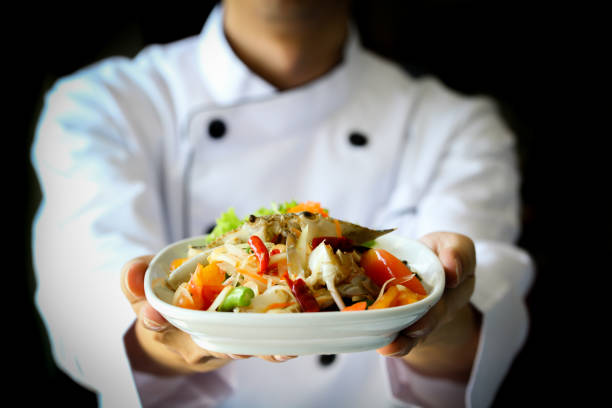Culinary Alchemy: Transforming Humble Ingredients into Gourmet Delights
Discover the art of elevating everyday ingredients into extraordinary dishes. This culinary journey explores innovative techniques and creative pairings that transform simple staples into restaurant-worthy masterpieces. From upcycling leftovers to reimagining pantry basics, learn how to unleash your inner chef and create gourmet meals on a budget.

Upcycling Leftovers: From Mundane to Magnificent
Leftovers don’t have to be boring rehashes of yesterday’s meals. With a bit of creativity, you can transform them into entirely new and exciting dishes. Turn leftover roast chicken into a luxurious chicken pot pie with a flaky crust, or blend it into a creamy chicken salad with grapes and walnuts. Day-old bread becomes the star of a rustic panzanella salad or a rich bread pudding. Even vegetable scraps can be repurposed into flavorful stocks or crispy chips. By approaching leftovers as ingredients rather than finished dishes, you open up a world of culinary possibilities that reduce food waste while delighting your taste buds.
The Art of Presentation: Plating Like a Pro
They say we eat with our eyes first, and presentation can elevate even the simplest dishes to gourmet status. Learn the basics of professional plating techniques to make your home-cooked meals look as good as they taste. Start with a clean, appropriately sized plate and consider color contrast, texture variety, and negative space. Use odd numbers of elements for a visually appealing arrangement, and play with height to create dimension. Garnishes should be thoughtful and edible, enhancing both the appearance and flavor of the dish. With these techniques, you can transform a humble bowl of soup or a basic salad into an Instagram-worthy masterpiece that’s sure to impress.
Pantry Staples Reimagined
Your pantry is a treasure trove of potential gourmet ingredients waiting to be discovered. Take common staples like canned beans, instant noodles, or boxed mac and cheese, and elevate them with unexpected additions and techniques. Transform canned chickpeas into crispy, spiced falafel or a silky hummus. Upgrade instant ramen by adding a soft-boiled egg, fresh vegetables, and a drizzle of chili oil. Turn boxed mac and cheese into a sophisticated truffle-infused pasta bake with breadcrumbs and herbs. By thinking outside the box and combining pantry staples with fresh ingredients and creative techniques, you can create restaurant-quality meals without breaking the bank.
The Power of Texture: Crispy, Creamy, Crunchy
Texture plays a crucial role in elevating dishes from ordinary to extraordinary. By incorporating a variety of textures, you can create a more complex and satisfying eating experience. Add crunch to creamy soups with homemade croutons or toasted nuts. Contrast the softness of mashed potatoes with crispy fried shallots. Introduce a silky element to salads with a perfectly poached egg or a dollop of whipped goat cheese. By paying attention to the interplay of textures in your dishes, you can transform simple ingredients into multi-dimensional culinary experiences that delight the palate and keep diners coming back for more.
Culinary Alchemy Tips & Facts
• Toast spices before using them to enhance their flavor and aroma.
• Use a microplane to zest citrus fruits for an instant flavor boost in both sweet and savory dishes.
• Finish dishes with a drizzle of high-quality olive oil or a sprinkle of flaky sea salt for added depth.
• Experiment with different cooking methods for the same ingredient to discover new flavors and textures.
• Learn the art of balancing flavors: sweet, sour, salty, bitter, and umami.
• Invest in a few key kitchen tools, like a good chef’s knife and a cast-iron skillet, to elevate your cooking game.
• Don’t be afraid to mix cuisines and create fusion dishes that showcase your creativity.
In conclusion, culinary alchemy is about more than just following recipes – it’s about unleashing your creativity and transforming everyday ingredients into extraordinary meals. By mastering techniques like flavor layering, upcycling leftovers, and professional plating, you can elevate your home cooking to restaurant-quality status. Remember that the key to great cooking lies not just in expensive ingredients, but in the passion and innovation you bring to the kitchen. So go forth and experiment, turning humble staples into gourmet delights that will impress both your taste buds and your dinner guests.





